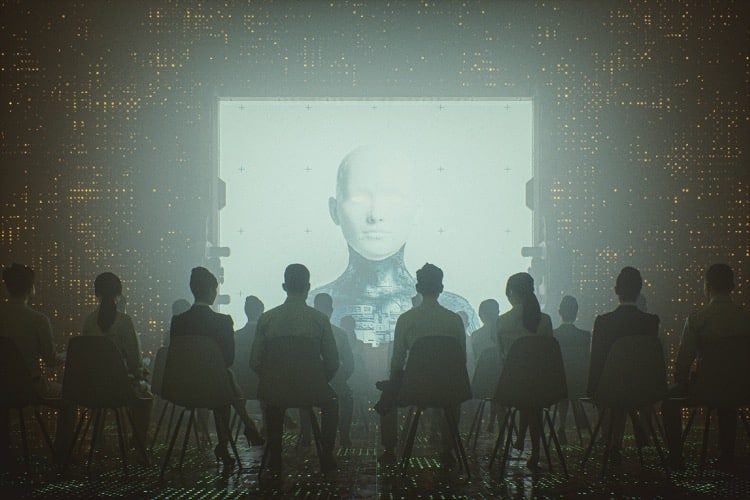
Fifty-five years ago already, Star Trek portrayed civilizations that worshiped über-powerful, artificially intelligent computers. In “The Return of the Archons” (1967), controlled and sometimes terrified people speak of the “will of Landru,” who is “everywhere” and stamps out individuality to absorb humans into a collective called “The Body.” In “The Apple” (1967), a planet’s primitive inhabitants worship a computer they fancy a deity, one that will kill anyone threatening its power. Yet with actual artificial intelligence (AI) now being developed, some are wondering if life will imitate art.
This issue has again been raised after billionaire tech mogul Elon Musk revealed that Google co-founder Larry Page aspires to create an AI super-intelligence that would essentially be a “digital god.”
In a recent interview with ex-Fox News host Tucker Carlson, “Musk pointed to a number of public statements made by Page over the years showing that ‘the whole goal of Google is what’s called AGI, artificial general intelligence or artificial super-intelligence,’” relates The Christian Post.
“The ultimate search engine would understand everything in the world. It would understand everything that you asked it, and give you back the exact right thing instantly,” the site quotes Page as saying at the Zeitgeist ’06 event in London.
Of course, providing “the exact right thing instantly” requires complete infallibility — something only God possesses.
Page is far from alone, of course. “According to former Google engineer Anthony Lewandowski, AI would have the entire internet at its disposal, much like our own nervous system, and all the phones, tablets, PCs, and other connected devices would, in effect, be its sense organs,” writes American Thinker’s Matt Rowe. “The AI will see and hear everything and be everywhere at all times. Lewandowski argues that the only rational word to describe that is ‘god’ — and he believes that humans will basically have to worship and pray to AI to influence its decision-making.”
Lewandowski has even founded a religion based on this belief called “Way of the Future.”
As for the present, technology has already to a degree “busted down the church door in the past few decades,” notes The American Spectator’s Tom Raabe in “The AI Threat to Religion.”
“Online worship and streaming services — thank you, Dr. Fauci and lockdown governors — are routine these days,” Raabe continues. “Physical hymnals have joined the passing of the plate as largely passé, replaced by, respectively, worship screens and online giving. Many don’t carry a physical Bible to church or Bible study anymore, what with any Scripture passage a few taps distant on their smart phones. As for devotionals, prayers, hymns, spiritual songs — there’s an app for all those.”
Raabe then tells the story of how last December, a New York rabbi asked ChatGPT to write him a sermon about an esoteric part of the Torah. His congregation, after hearing it and being told it’d been plagiarized but not from whom, “thought it was penned by a great rabbi of the past,” relates Raabe.
This isn’t to say AI already surpasses our best theologians. Quoting others, Raabe writes that ChatGPT is “an exegete but a shallow one,” “a correlation machine” that “predicts the likelihood of the following word.” It “is not sentient.”
At least, that is, not yet. Sentience attainment is what many — Musk among them apparently — fear. Yet this capacity could come at the moment of the “singularity,” which is that point where “AI becomes so powerful and complex that it actually becomes aware of itself and starts making its own decisions regardless of human imperatives,” writes Rowe. “This is the driving fear behind the Terminator franchise and other such stories. Could it happen?”
That is the question, isn’t it? Some say AI will always be a “correlation machine,” only as good as the programming humans provide and ever subject to having its plug pulled. But is this short-sighted?
Consider: If something occurs in the physical world, we know it’s possible. And if it occurs and we can observe it long enough, and come to understand it, I believe we can eventually replicate it.
Alright, well, humans — these beings with intellect and free will — “occur” in our world. So as technology advances and understanding of the brain increases, could we eventually create an artificial entity that also possessed intellect and free will? I suspect so.
This theory could be tenable to both secularists and theists. With the former, their implied belief is that man is a mere organic robot, some pounds of chemicals and water. And then the idea that we could create inorganic robots that could mirror us shouldn’t seem far-fetched.
As for theists, remember that we’re not talking about replicating what cannot be observed in the material world — the soul — only about replicating what can be. So unless one believes that the “mind,” which philosophers often consider a non-material entity separate from the brain, is required for intellect and free will, there’s little if any reason to doubt the sentient-machine thesis.
Note, too, that while we’re not God and can’t do all He can, we are His children and have the capacity to do much of it. Hence the continual fear of and warnings about “playing God.”
Speaking of which, it’s easy to see how being known as the man who created the “digital god” would engender intense ego satisfaction, especially among godless people. Yet if their creation truly reflected them, would they be remembered as anything? Or would its super-intelligence be matched by a super-ego that would share credit with no one? And harking back to Page’s words, what would the AGI define as “the exact right thing,” morally, having been created by godless people whose convenient guiding philosophy is moral relativism?
It would be ironic if, taking the relativism-born disbelief in Truth to its logical conclusion, the AI pseudo-god had no conscience because it decided there was nothing to be conscientious about (no morality) and became not the ultimate worldly savior, but the ultimate sociopath. For then its creator might be happy to be forgotten — for having birthed a digital devil.



